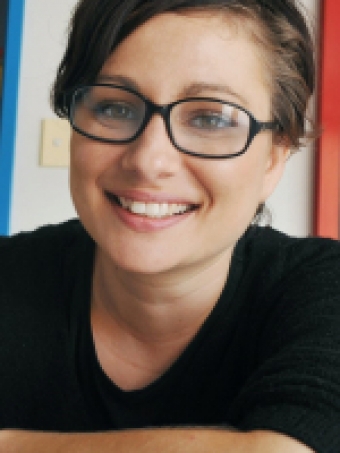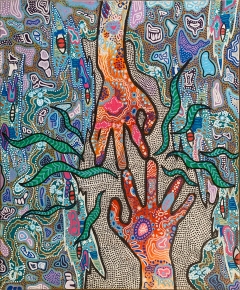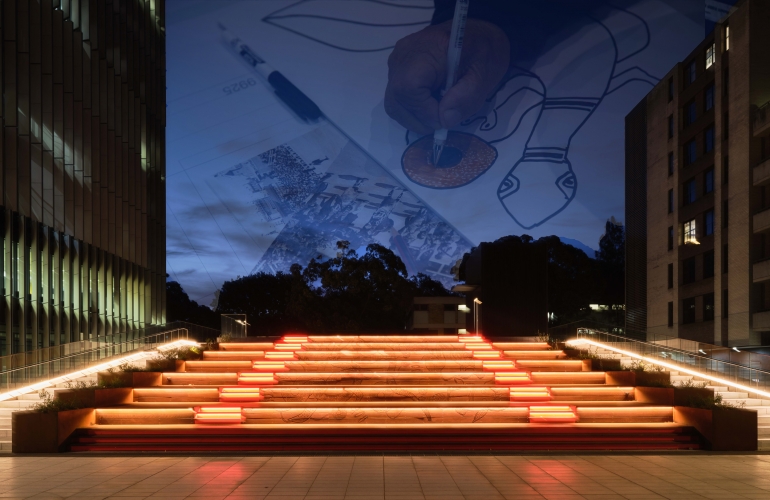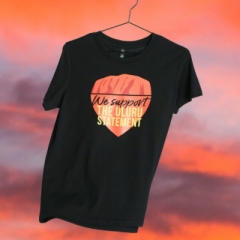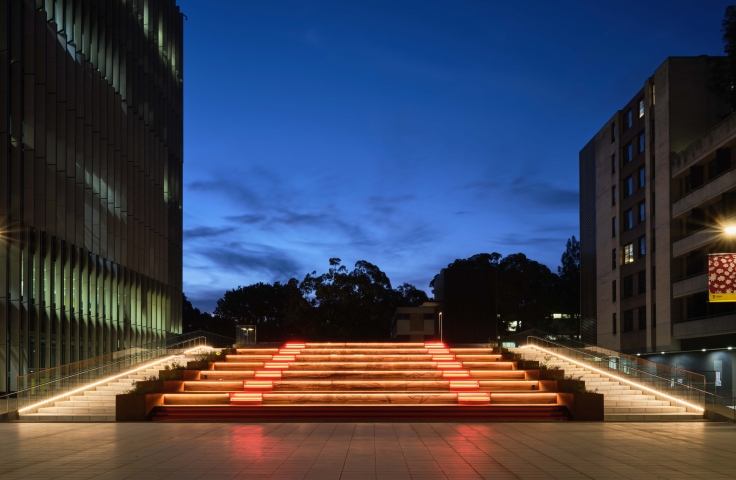In our last newsletter, it was NAIDOC Week and we had just entered the second Greater Sydney lockdown. We could not have predicted that for months we would be in lockdown in NSW with the COVID-19 Delta variant devastating many communities.
This wave in NSW, unlike the first wave, hit Aboriginal communities harshly both in the Greater Sydney area and in Aboriginal communities in Western NSW such as Wilcannia and Walgett, most acutely. It saw the first Aboriginal deaths from the pandemic something many communities fought hard to prevent. We pay our respects to all First Nations peoples and communities who lost loved ones.
Aboriginal societies are gerontocracies, meaning our old people, our Elders, are the cultural authority and decision-makers. Our old people are our knowledge keepers and are holders of our law. This is why the impact of COVID is so devastating. It has been a difficult time for many First Nations in the UNSW community with many kin impacted as the coronavirus entered our communities.
Dr Kalinda Griffiths, Yawuru woman, epidemiologist, and Scientia Fellow, who we are tremendously proud of, has played an important role in helping our communities understand the pandemic. Dr Griffiths had pointed out in her writing that First Nations communities were not properly involved in the vaccination rollout. This is despite much lip service being given to the Coalition of Peaks being a partner in Closing the Gap version 2 that was signed in 2020. Dr Griffiths highlighted the failures of properly communicating data for Aboriginal communities.
The stories that have come from these communities as COVID-19 hit are harrowing. But as Aboriginal people, our communities have banded together. As we always do. This can be seen by the remarkable community responses to these challenges – Wilcannia pushed its cases down to zero earlier this month – as well as grassroots groups supporting families and people impacted.
We also recognise our First Nations brothers and sisters at UNSW who come from QLD and NT and WA and other states. Government modelling predicts that significant deaths are “inevitable” in Aboriginal Communities as a consequence of the opening up of state borders when the vaccination rates are so poor in grassroots communities because of the failed vaccination roll-out. We wish those communities well.
I have been proud to see many Aboriginal UNSW students, researchers and alumni activating and supporting where they can, with initiatives such as the First Nations Response in the inner west, and the support for Dharriwaa Elders Group, with who UNSW have a long relationship through Yuwaya Ngarra-li, when COVID-19 entered Walgett. This is the strength of our communities and culture – of giving back.
We do reiterate the University’s position that it is important that all Aboriginal and Torres Strait Islander students are vaccinated. Vaccination is essential for combating the spread of the COVID-19 and for ensuring those who do have a breakthrough infection, the impact is not as acute or life-threatening as it is for unvaccinated individuals. It is critical for the smooth return of our Indigenous student body and staff collegiate to UNSW and the Nura Gili building. More importantly, vaccination is essential to protect our Old People. It’s a sign of cultural respect for our Elders who will struggle at their age to fight Covid-19.
ADA Indigenous Strategy, Guruwaal, Welcome to Country, and new Uluru tees
During the lockdown, there have been some major developments. The ADA Faculty has launched their faculty-based Indigenous Strategy, in response to UNSW’s Indigenous Strategy and its pillars: Culture and Country, Give Back, and Grow Our Own. We recognise our sister Dr BJ Newton who has led this work for ADA as Associate Dean Indigenous.
In other, most wonderful news, the Alumni Park revitalisation project has finished its construction. A key element, in line with our strategy, has been a new artwork – designed by local Elders over many months of consultation, workshops and yarning.
Titled “Guruwaal”, the artwork is set on timber bleachers that have been added to the steps of the Esme Timbery Creative Practice Lab – which was the first building at UNSW to be named after an Aboriginal woman. It heralds the story of animals from the ocean shores up to the higher lands of UNSW.
When you can – and it is safe to do so – I urge you all to see the artwork in person on campus. We have a photo gallery you can also see online.
Artwork credit to: Uncle Greg Simms (Gadigal/Dharug), with guidance by Aunty Marjorie Dixon (Bidjigal) and Uncle Assen Timbery (Bidjigal) and interpretations by Danièle Hromek (Budawang/Yuin) and Samantha Rich (Wiradjuri).
I look forward to seeing the other elements of the artwork completed, including an audio project with local Elders which will be housed on our website.
Another issue has arisen from two years of Covid and lockdown life on Zoom and Teams and that is the proliferation of virtual “Acknowledgments of Country”. It is tremendous to witness so many UNSW staff and students learn about and know the Nation they live on and were locked down on.
However, the virtual embrace of acknowledgments should not extend to developing “Welcome to Country” videos that obviate the need for real-time welcomes and acknowledges or engagement with traditional owners and elders on a case by case basis. Indeed some Elders rely on that regular income. A recorded WTC for convenience, with a percentage fee for repeated use, can be regarded as offensive. It can reduce a meaningful cultural exchange to a mere transactional one.
As digital events become more common, it’s important to consider these cultural protocols and how to navigate them respectfully.
It does not take much to “Google” and read concerns and objections First Nations people have with Acknowledgments to Country. These concerns are increasingly ventilated in other countries like Canada too where symbolic measures such as AOC are preferred by settle societies to the recognition of substantive rights for Indigenous peoples.
Lastly, it’s exciting to announce that the Uluru Dialogue – at UNSW Indigenous Law Centre – has partnered with THE ICONIC for Uluru Dialogue tees. Until now, such T-shirts were only available to Indigenous people. But we have been overwhelmed by Australians wanting to show their support. By wearing the Uluru Statement tee, you are accepting the invitation from First Nations to ‘’walk with us in a movement of the Australian people for a better future” and you raise awareness of the Uluru Statement with your family, friends, colleagues and communities.
All proceeds go to supporting the Uluru Dialogue and our community legal education work.
Professor Megan Davis
UNSW Pro Vice-Chancellor Indigenous, Balnaves Chair in Constitutional Law, and Professor of Law
